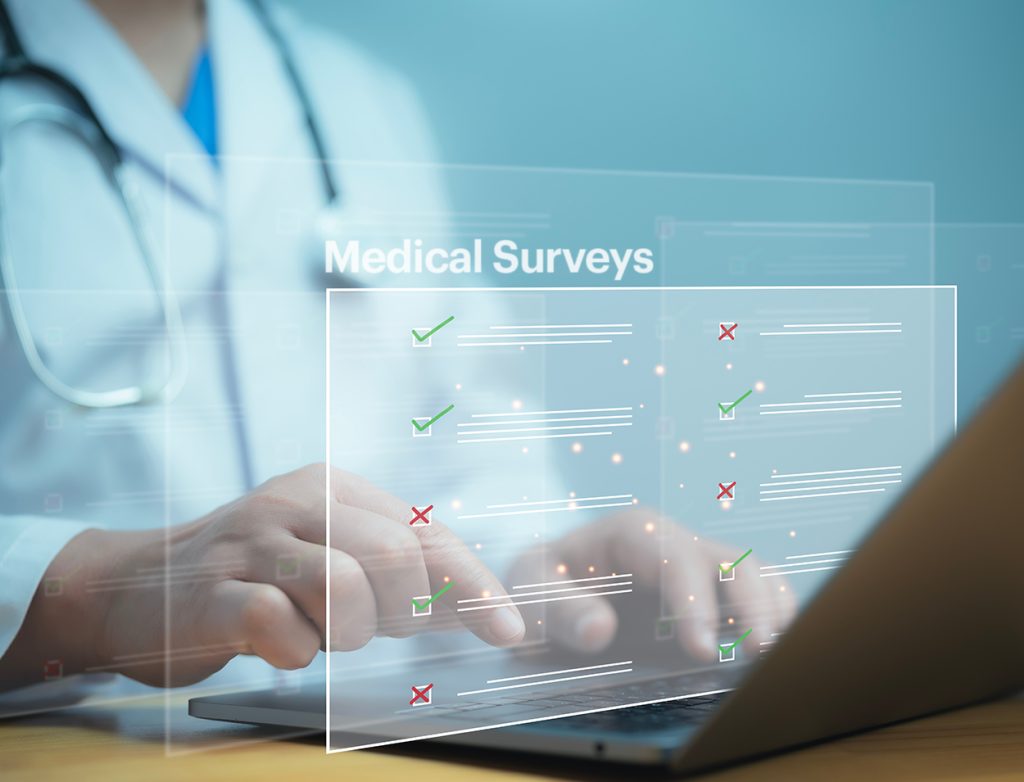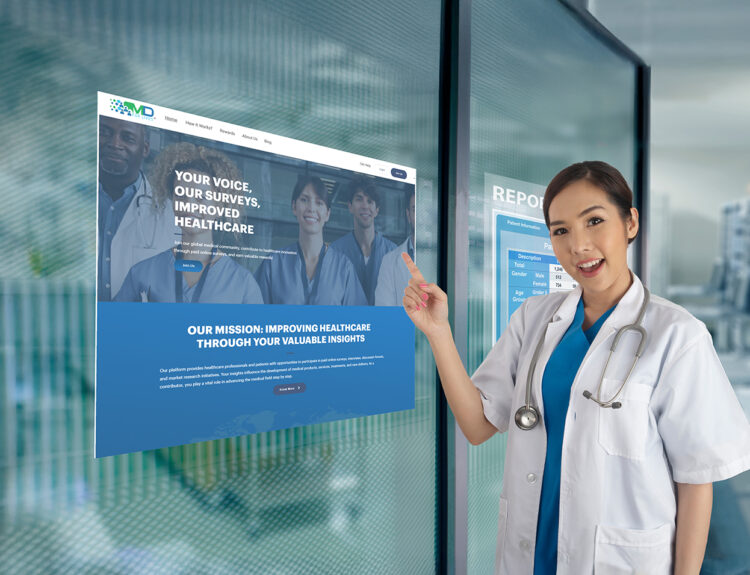Medical surveys are changing the game in healthcare. They gather intel from healthcare professionals (HCPs) to help researchers and various healthcare organizations understand and improve medicine. Think of them as a way for the best medical specialty doctors to share their knowledge and experiences, helping to shape the future of healthcare. But there is an additional bonus – they are a lucrative side hustle for healthcare professionals.
Many healthcare professionals get paid for their time, making surveys a great way to earn extra cash while contributing to something bigger. It is a win-win situation, and that is why more healthcare professionals are registering with platforms like ours – MDForLives, that compensate fairly for taking medical surveys. What is even more intriguing is how some of the best medical specialties play a crucial role. Have you ever wondered how a neurologist’s insight on Alzheimer’s compares to that of a general practitioner? Both perspectives are essential, ensuring that healthcare research is comprehensive and grounded in real-world experience.
Best Medical Specialty Doctors Driving Healthcare Research
When it comes to shaping the future of healthcare research, six “most in demand specialties” stand out for offering more opportunities to participate in impactful surveys. These best medical specialty doctors provide crucial insights and play a significant role in guiding medical advancements.
Below, we have highlighted the top medical specialties for your review:
Rank 1: Oncology – Leading the Fight Against Cancer
Did you know that oncologists, one of the best medical specialties, regularly engage in medical surveys?
Their high level of participation underscores the critical role of oncology in research and highlights the pressing need for more effective cancer treatments. Advancements in therapies like immunotherapies and targeted treatments have led to an increased demand for oncologists’ insights through surveys. These surveys often focus on evaluating the efficacy of new drugs, managing side effects, and optimizing treatment protocols.
Their contributions are invaluable, influencing everything from drug approvals to the development of practice guidelines. By participating in oncology surveys, oncologists ensure new treatments and protocols are based on real-world insights and clinical experience.
Hence, we have ranked ‘Oncology’ as number one and the best medical specialty.
Oncology Earnings from MDForLives Medical Surveys:
| Country | Average Earnings per Survey | Notable Insights |
| United States | $10 – $250+ | High participation; diverse oncology topics including CAR T-cell therapy for glioblastoma. |
| United Kingdom | $10 – $250+ | Active engagement; surveys on biosimilar adoption and treatment protocols. |
| Canada | $10 – $250+ | Moderate participation; focus on treatment gaps and patient behavior. |
| Germany | $10 – $250+ | High participation; significant insights on biosimilar usage. |
| Italy | $10 – $250+ | High participation; early adoption of biosimilars. |
| France | $10 – $250+ | Active participation; diverse oncology topics covered. |
Rank 2: Cardiology – Pioneering Heart Health and Lifesaving Care
Heart disease remains a leading cause of mortality worldwide. As a result, cardiology, one of the best medical specialties in the future, offers abundant research opportunities.
The field is constantly evolving with new research, treatments, and technologies. There are ongoing advancements in cardiovascular care – spanning from minimally invasive surgical techniques to innovative drug therapies. As a result, cardiologists, among the types of doctor specialists in high demand, are frequently invited to provide their expert input through best paid medical specialty surveys.
Medical research surveys in cardiology often focus on evaluating the effectiveness of new heart medications and patient outcomes after surgery. They also explore cutting-edge diagnostic tools, such as CT angiography and wearable heart monitors. The feedback gathered from these cardiology surveys could influence drug usage guidelines, ensuring the right medical specialty expertise informs patient care.
Participation in these surveys also helps shape innovations in the highest paying medical specialties, including bioabsorbable stents and advanced heart failure therapies, underscoring cardiologists’ pivotal role in advancing healthcare.
Cardiology Earnings from MDForLives Medical Surveys:
| Country | Average Earnings per Survey | Notable Insights |
| United States | $10 – $250+ | High participation; diverse cardiology topics including heart failure management and arrhythmia treatments. |
| United Kingdom | $10 – $250+ | Active engagement; surveys on statin therapy and hypertension management. |
| Canada | $10 – $250+ | Moderate participation; focus on cardiovascular risk assessment and prevention strategies. |
| Germany | $10 – $250+ | High participation; significant insights on anticoagulation therapy and myocardial infarction protocols. |
| Italy | $10 – $250+ | High participation; early adoption of digital health tools in cardiology. |
| France | $10 – $250+ | Active participation; diverse cardiology topics covered, including lipid management and stroke prevention. |
Rank 3: Neurology – Decoding the Complexities of the Human Brain
The field of neurology has seen rapid growth in recent years, making it one of the best medical specialties for physicians interested in research and innovation. There is a rising prevalence of neurological disorders such as Alzheimer’s, Parkinson’s, and Multiple Sclerosis. As these conditions affect millions globally, the contribution of neurologists, among the most in-demand types of doctor specialists, to medical research through surveys is more crucial than ever. Their insights help shape the understanding of disease progression, treatment efficacy, and patient care strategies.
Neurology surveys usually emphasize the management of chronic neurological conditions, the impact of cognitive therapies, and advancements in neuroimaging techniques. For example, neurologists may assess the real-world effects of a newly approved Alzheimer’s drug or provide insights on the long-term benefits of deep brain stimulation for Parkinson’s patients. These surveys provide critical feedback that can improve patient outcomes by tailoring treatments to the specific needs of neurological patients.
As a medical specialty that intersects with emerging technologies, neurology surveys also explore innovations such as brain-computer interfaces and artificial intelligence in diagnosing and managing neurological conditions. This valuable input directly informs clinical practices, shapes new treatment guidelines, and accelerates the development of groundbreaking therapies. For neurologists, participation in these surveys not only advances science but also underscores why neurology is considered one of the highest paying medical specialties, reflecting its pivotal role in improving patient care and outcomes worldwide.
Neurology Earnings from MDForLives Medical Surveys:
| Country | Average Earnings per Survey | Focus Areas in Neurology Research |
| United States | $15 – $300+ | High-paying surveys on neurodegenerative diseases, epilepsy, and multiple sclerosis. |
| United Kingdom | $15 – $250+ | Focus on migraine therapies, Parkinson’s disease, and CNS drug development. |
| Canada | $15 – $250+ | Covers cognitive disorders, neuropathic pain, and stroke management. |
| Germany | $15 – $300+ | Studies on Alzheimer’s disease biomarkers and neuroimaging innovations. |
| Italy | $15 – $250+ | Surveys on epilepsy care, neurorehabilitation, and neuromuscular disorders. |
| France | $15 – $250+ | Research on MS treatment patterns and neuro-oncology advancements. |
Rank 4: Endocrinology – Balancing the Body’s Hormonal Symphony
This is one of the most in-demand specialties, given the increasing global burden of chronic diseases like diabetes, obesity, and thyroid disorders.
Endocrinologists are often invited to participate in surveys for their insights on the efficacy of new treatments, advancements in hormone therapies, and approaches to managing chronic metabolic conditions.
These surveys may cover cutting-edge diabetes management tools like continuous glucose monitors (CGMs) or assess the impact of newer medications, like GLP-1 receptor agonists, in controlling blood sugar levels.
Endocrinologists’ feedback in these surveys is vital to curate personalized medicine, particularly for treating lifelong conditions. Whether exploring hormone therapy for thyroid conditions or the long-term effects of insulin analogs, their insights help fine-tune treatment protocols. This ultimately improves patient outcomes and ensuring that healthcare strategies are practical and patient-centered.
Register Now to Participate in Endocrinology Surveys!!
Endocrinology Earnings from MDForLives Medical Surveys:
| Country | Average Earnings per Survey | Focus Areas in Endocrinology Research |
| United States | $10 – $250+ | Studies on diabetes management, thyroid disorders, and obesity treatments. |
| United Kingdom | $10 – $200+ | Focus on insulin delivery innovations, metabolic syndrome, and adrenal diseases. |
| Canada | $10 – $200+ | Surveys on diabetic technologies, hormone therapy, and endocrine oncology. |
| Germany | $10 – $250+ | Research on Type 2 diabetes care pathways and pituitary disorders. |
| Italy | $10 – $200+ | Topics include reproductive endocrinology and growth hormone therapies. |
| France | $10 – $200+ | Studies on endocrinopathies, lipid metabolism, and novel GLP-1 analogues. |
Rank 5: Dermatology – Beyond Skin Deep Care
Dermatology is a pivotal medical specialty that addresses conditions affecting the skin, hair, and nails. With skin-related issues, from acne and eczema to skin cancer on the rise, dermatologists, among the most sought-after types of doctor specialists, are increasingly consulted for their expertise in evolving treatments and diagnostic techniques.
Surveys targeting dermatologists often explore the latest advancements in skincare, including novel topical therapies, biologic agents for chronic skin conditions, and the effectiveness of emerging technologies like laser treatments and phototherapy. They also provide insights on preventive measures and early detection strategies for skin cancers, which is vital given the growing incidence of melanoma and non-melanoma skin cancers.
By participating in these surveys, dermatologists not only advance the field of dermatology but also contribute to the development of evidence-based protocols. This highlights why dermatology is considered one of the best paid medical specialties, allowing experts to combine patient care with research that drives innovation and improves outcomes for individuals worldwide.
Dermatology Earnings from MDForLives Medical Surveys:
| Country | Average Earnings per Survey | Focus Areas in Dermatology Research |
| United States | $10 – $250+ | High-paying surveys on psoriasis, acne, and atopic dermatitis treatments. |
| United Kingdom | $10 – $200+ | Studies on biologics, eczema management, and skin cancer therapies. |
| Canada | $10 – $200+ | Topics include cosmetic dermatology, phototherapy, and rosacea care. |
| Germany | $10 – $250+ | Focus on immunodermatology, hair loss, and chronic skin disease management. |
| Italy | $10 – $200+ | Surveys on pigmentary disorders, wound healing, and aesthetic innovations. |
| France | $10 – $200+ | Research on atopic dermatitis, psoriasis biologics, and dermatopathology trends. |
Rank 6: Primary Care – The First Line of Defense in Healthcare
Primary care is going to remain one of the most in demand medical specialties in the future as well. As the first point of contact for a broad patient population, Primary Care Physicians (PCPs) manage diverse conditions and guide patients through preventive care measures, making their participation in medical surveys crucial. Unlike specialists who may focus on specific conditions or treatment areas, PCPs bring a holistic perspective, offering insights into general health trends and patient behaviors that span multiple medical disciplines.
Given their direct interaction with patients and their role in administering vaccines, PCPs’ feedback can provide invaluable data that helps refine vaccination efficacy, chronic disease management, and preventive health strategies. Their role in administering vaccines, especially for widespread public health initiatives such as influenza or COVID-19 vaccinations, provides them with critical real-world experience.
Furthermore, because PCPs frequently manage patients with co-existing conditions, their feedback can help guide research into how best to coordinate care across specialties. For example, a PCP’s input on managing hypertension in a diabetic patient could influence broader guidelines that affect both endocrinologists and cardiologists. They ensure that survey results are well-rounded, capturing a comprehensive snapshot of healthcare challenges and solutions.
Primary Care Physician Earnings from MDForLives Medical Surveys:
| Country | Average Earnings per Survey | Focus Areas in Primary Care Research |
| United States | $10 – $200+ | Surveys on preventive care, chronic disease management, and vaccination protocols. |
| United Kingdom | $10 – $180+ | Research on patient engagement, telehealth, and cardiovascular risk reduction. |
| Canada | $10 – $180+ | Topics include diabetes, hypertension, and lifestyle intervention studies. |
| Germany | $10 – $200+ | Studies on multimorbidity care, prescription trends, and patient adherence. |
| Italy | $10 – $180+ | Focus on integrated primary care, geriatric management, and early diagnosis programs. |
| France | $10 – $180+ | Research on clinical workflows, chronic disease follow-up, and health system efficiency. |
Do Doctors Ever Change Medical Specialties?
While choosing a medical specialty is often seen as a lifelong commitment, many physicians eventually reconsider their path. Career satisfaction, lifestyle preferences, and highest salary are powerful motivators that drive doctors to explore new directions within medicine. Some transition to different types of doctor specialists or shift toward internal medicine specialties that offer more flexibility or align better with their evolving interests.
In recent years, there has been a noticeable trend of physicians moving toward the best paying jobs in medical specialties or seeking the highest paying medical specialties that promise both professional growth and financial stability. Others pivot from demanding surgical fields to less intensive roles, prioritizing work–life balance and long-term well-being.
Changing a medical specialty isn’t a simple decision—it requires additional training, certification, and adaptability. However, it also opens new opportunities for career advancement and fulfillment. Ultimately, the best medical specialty is one that not only offers the highest salary medical specialties but also aligns with a physician’s passion, values, and desired impact on patient care.

How Physicians from the Best Medical Specialties can Find and Maximize Survey Opportunities
To fully leverage the potential benefits, healthcare professionals need to understand how to discover and capitalize on survey opportunities.
Here are some practical tips to help them do just that:
- Register with Professional Networks: Physicians seeking to participate in medical surveys should join specialized professional networks. Platforms like ours offer a variety of paid surveys tailored to the best medical specialties. HCPs can receive notifications about new surveys that match their expertise, ensuring they take advantage of every opportunity.
- Stay Updated on Research Trends: Keeping up with the latest research trends in their medical specialty is crucial for physicians to identify relevant survey opportunities. Staying informed about emerging treatments, technological advancements, and shifts in clinical practices allows physicians to participate in surveys that align closely with their expertise.
- Leverage Professional Associations: Professional associations often allow their members to participate in surveys and research studies. These organizations frequently collaborate with research institutions and survey platforms to gather data from their members. It makes them an excellent resource for finding survey opportunities.
- Optimize Survey Participation: To maximize the benefits of participating in medical surveys, physicians across different types of doctor specialists should approach each survey thoughtfully. Effective time management, accurate and thorough responses, and prompt follow-up on survey invitations are key practices.
When physicians receive a survey invitation, it is important to set aside dedicated time to complete it, ensuring detailed and thoughtful responses. Keeping track of completed surveys and any follow-up requests from survey organizers helps ensure that all benefits of participation, such as compensation and professional recognition, are received.
This approach also contributes to building a reputation as a reliable and knowledgeable contributor to medical research.
Take Specialty-Specific Surveys and Advance Healthcare Research
Don’t just watch from the sidelines as healthcare evolves. Take an active role in shaping its future!
If you’re a physician in one of the six best medical specialties highlighted in this blog, now is the time to register with MDForLives. By participating in our paid medical surveys, you can directly influence the direction of future research, earn passive income, and play a crucial role in developing better healthcare solutions and enhancing patient care.
Your expertise as a physician in the best medical specialty can drive meaningful change. So, step up, and make an impact today!

MDForLives is a vibrant community of healthcare professionals and patients dedicated to shaping the future of healthcare. We provide valuable global insights to healthcare companies through online surveys, interviews, and discussion forums.






